Dear Friends,
This month we bring you news from Colombia, Brazil, Venezuela, Ecuador, Chile, Peru, and Argentina.
Highlights are:
Colombia: The UN’s Working Group on Business and Human Rights has found that ‘Colombia suffers from long-standing structural problems that have led to serious human rights violations’
Brazil: Amnesty International has launched a petition to urge the Brazilian Ministry of Human Rights and Citizenship to implement the Program for the Protection of Human Rights Defenders
Venezuela: Mass demonstrations, following the presidential election, led to hundreds of protesters being arbitrarily detained – there is an Urgent Action
Ecuador: In a new report, and petition, Amnesty International reveals how the Ecuadorian state is failing in its duty to reduce greenhouse gas emissions, allowing the operation of gas flares.
Chile: The trial preparation has at last been held in the case against a former Carabineros officer accused of blinding Gustavo Gatica, Amnesty International Individual at Risk.
Peru: There have been important developments following the publication of Amnesty International’s report, Who Called On The Shots?
Argentina: Amnesty International had sent Congress a guide explaining problems with the Argentine pension system and the need for reform that guarantees retirees a dignified life.
COLOMBIA
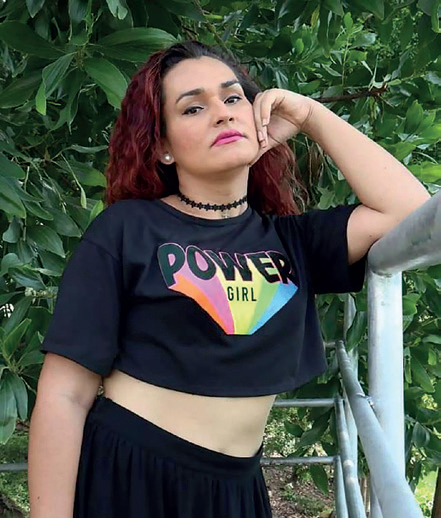
In a an appeal to support Colombia’s peace process, WOLA, alongside 172 individuals and organizations, calls for immediate action to resume the peace talks between the Colombian Government and the ELN (National Liberation Army) and to extend the bilateral ceasefire that expired on August 3. The implementation of the Ethnic Chapter of the 2016 Peace Accord should be prioritised. This includes humanitarian relief and protection measures for indigenous and black communities. Negotiations ended when the ELN resumed its kidnappings and other illegal activities to fund the armed group.
In another setback to President Petro’s ‘Total Peace Plan’, Colombia Reports that EMC (Former FARC) commander “Ivan Mordisco” declared war on dissident guerrilla units that decided to negotiate peace with the government without his approval. ‘The declaration of war could have major consequences in southern Colombia where the Amazonas Bloc and the Jorge Suarez Briceño Bloc of dissidents operate.’
A gathering of 4,200 representatives of indigenous communities from the Cauca, where the war between armed groups has intensified, are in Bogotá seeking to meet President Petro. They demand that the government stop the fighting. Although they have yet to meet the President, they have achieved another goal, to obtain an ATEA (Territorial and Economic and Environmental Authority) decree for the Cauca region. This will enable indigenous communities to register their land claims and strengthen their legal position in respect of third parties.
The UK NGO ABColombia writes, ‘Despite Colombia’s Indigenous Peoples comprising only 3.9% of the total population, they are subjected to disproportionate violations of their human rights by illegal armed groups and large multinational corporations.’ These include British-registered Glencore, which has diverted streams and rivers in La Guajira, damaging the Wayúu Peoples access to safe drinking water and their food production. ‘As well as targeting individuals, armed groups continue to force whole Indigenous communities into precarious situations of confinement, displacement or heightened violence.’
The UN’s Working Group on Business and Human Rights has found that ‘Colombia suffers from long-standing structural problems that have led to serious human rights violations and abuses in the context of business operations.’ The experts add that the Colombian government needs ‘to prioritise the implementation of laws and policies addressing business-related human rights abuses for the protection of people and the environment.’
The UN’s Special Rapporteur on extreme poverty and human rights will conduct an official visit to Colombia from 26 August to 4 September. ‘He will pay particular attention to the situation of groups disproportionately affected by poverty including women, children, persons with disabilities, older persons, informal workers, young, victims of armed conflict, peasants, and ethnic groups.’ With a GINI coefficient of 51.4, Colombia has one of the highest levels of income inequality in the world.
BRAZIL
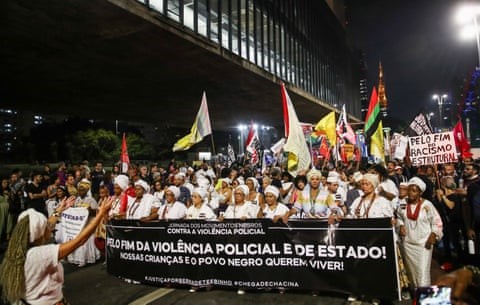
Amnesty International has launched a petition to urge the Brazilian Ministry of Human Rights and Citizenship to implement the Program for the Protection of Human Rights Defenders, Communicators and Environmentalists and to guarantee the establishment of a National Plan for the Protection of Human Rights Defenders. Brazil has the 4th highest number of human rights defenders who are killed in the world. Please sign the petition.
The Guardian reports that activists have raised the alarm over police violence in the Brazilian state of Bahia, as new figures revealed that more children and adolescents are killed by the region’s security forces than anywhere else in the country. Last year, one in every three child victims of homicide in Bahia was killed by the police. 95% of the victims of police killings in Bahia are Black. a Black boy is 4.4 times more likely to be murdered than a white boy.
Amazon Watch and other NGOs urge the federal government to repeal a Bolsonaro-era Executive Ordinance 112/2021 (IN 112). This established new rules for the use of settlement areas by mining, energy, and infrastructure projects. ‘Despite years of scrutiny and media outcry, IN 112 continues to pose risks to environmental protection and to violate the territorial rights of local communities by facilitating the allocation of rural settlement areas – which should be destined to food production, food sovereignty, and environmental defence – to mining companies and other industrial projects.’
VENEZUELA
Human rights campaigners continue to express concern over the arbitrary detention of protesters in Venezuela. In its continued monitoring of repression in Venezuela, as of 26th August, Foro Penal outlined that there were 1,780 political prisoners, including 114 aged between 14 to 17 years old. Human Rights Watch have issued a statement noting “widespread human rights violations against protesters, bystanders, opposition leaders, and critics” and have called for governments to “push for independent verification of the electoral results”. Amnesty International has an Urgent Action, which we encourage members to sign.
Human Rights Watch noted that armed groups, known as “colectivos”, have committed widespread abuses, including killings, arbitrary detentions, and harassment. There is evidence of abusive raids conducted by the government, particularly in low-income communities. The Venezuelan courts have also issued an arrest warrant for Edmundo Gonzalez, the opposition politician believed to have beaten President Maduro, for alleged crimes that could see him imprisoned for life. International leaders have condemned the arrest order.
More widely, the United Nations Electoral Technical Team and the Carter Centre, both of which observed the elections, stated that the election lacked transparency and integrity, questioning the declared result. Both have said that precinct level tally sheets, made public by the opposition and suggesting that the opposition had won, were reliable. The Colombian, Brazilian, and Mexican governments have all called for talks with the Venezuelan government, whilst the Permanent Council of the Organization of American States approved by consensus a resolution urging Venezuelan authorities to publish precinct tally sheets and carry out an “impartial verification” of the results.
Amnesty International has released a press statement outlining concerns that the Venezuelan government has used the Venezuelan government-backed app, VenApp, to report people voicing dissent. VenApp was launched by President Nicolas Maduro in 2022 ostensibly to receive public complaints on issues such as power outages and medical emergencies. It appears to have been repurposed with additional functionality after the announcement of Maduro’s re-election, enabling users to make reports against protestors. The app has since been removed from the app stores.
The Guardian has reported that journalists are using artificial intelligence avatars to report news which they believe may make them the target of government persecution. Connectas, a Colombi-based journalism platform, is being used to coordinate the initiative.
ECUADOR
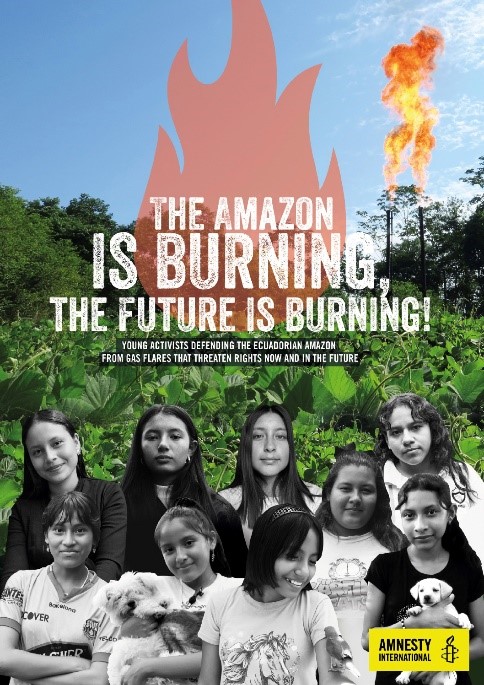 In a new report, “The Amazon is burning, the future is burning!” Young activists defending the Ecuadorian Amazon from gas flares that threaten rights now and in the future, Amnesty has revealed how the Ecuadorian state is failing in its duty to reduce greenhouse gas (GHG) emissions by allowing the operation of gas flares in the Amazon. Despite a 2021 court ruling ordering the elimination of gas flaring, the Ecuadorian state continues to allow this harmful practice by the fossil fuel industry. Moreover, flaring is directly linked to global warming and the emission of super pollutants such as methane, thus threatening the enjoyment and guarantee of human rights now and in the future. Please sign the petition here.
In a new report, “The Amazon is burning, the future is burning!” Young activists defending the Ecuadorian Amazon from gas flares that threaten rights now and in the future, Amnesty has revealed how the Ecuadorian state is failing in its duty to reduce greenhouse gas (GHG) emissions by allowing the operation of gas flares in the Amazon. Despite a 2021 court ruling ordering the elimination of gas flaring, the Ecuadorian state continues to allow this harmful practice by the fossil fuel industry. Moreover, flaring is directly linked to global warming and the emission of super pollutants such as methane, thus threatening the enjoyment and guarantee of human rights now and in the future. Please sign the petition here.
On 20 August, President Noboa signed a decree for a Public Policy to Eradicate Sexual Violence in Schools, described by Human Rights Watch as an important step to address the problem. Sexual and gender-based violence is endemic in Ecuador’s schools. Over the last decade, the Ministry of Education received reports of close to 6,500 cases of school-related sexual violence, affecting 7,303 children across the country. These numbers undoubtedly understate the true total, as most cases of sexual violence go unreported.
CHILE
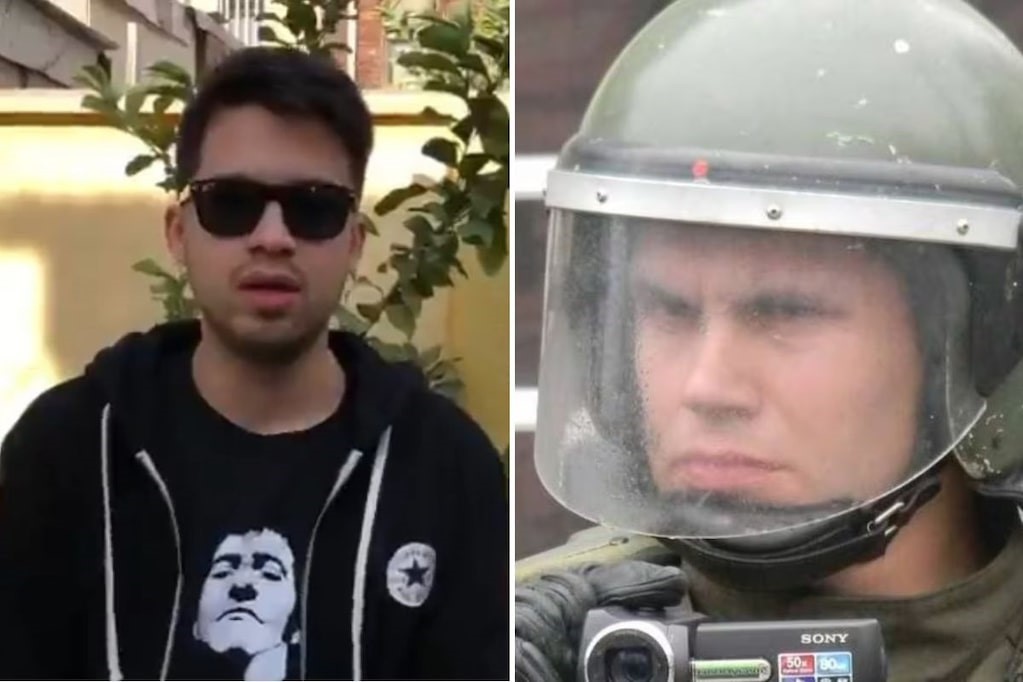
After being rescheduled three times, the trial preparation was held for Gustavo Gatica last month. Gustavo was blinded in both eyes after being shot during the peaceful protests of 2019. Prosecutors requested 12 years in prison for the former Carabineros officer Claudio Crespo, accused of unlawful coercion resulting in very serious injuries against Gustavo Gatica. The trial itself is expected to begin by January 2025. Gustavo has launched his own YouTube Channel to keep the public informed. Amnesty International Chile will continue to observe developments in this long campaign for justice.
PERU
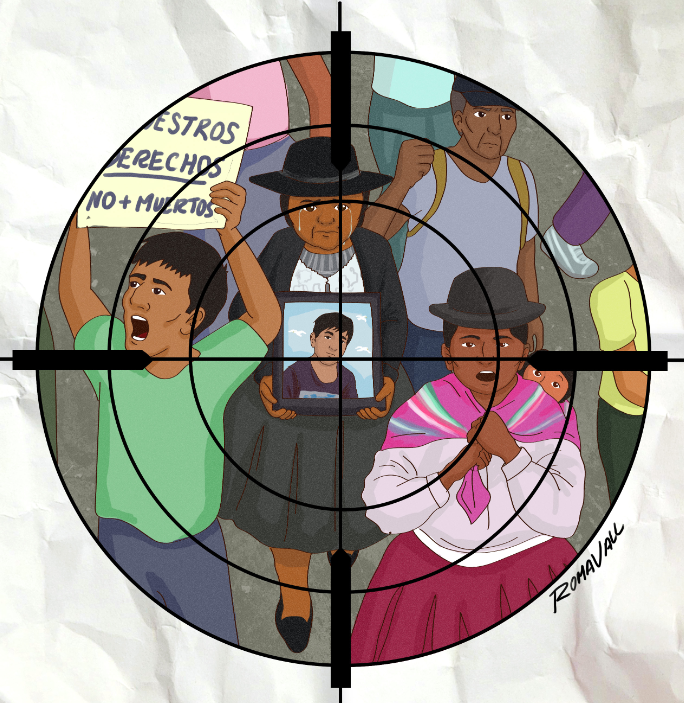
Following the July publication of Amnesty’s report Who Called On The Shots?, there have been important developments in initiating criminal proceedings against the authorities allegedly responsible for the serious human rights violations committed during the 2022-23 protests, including top-ranking police and military officials and high-level civilian officials. These include formalised criminal proceedings against the former Commander General of the Peruvian National Police and a constitutional complaint against President Dina Boluarte and several former ministers.
The investigation against the President and former ministers is now in the hands of the Congress, which according to the Constitution has to approve the Constitutional Complaint so that the President’s immunity can be removed and she can be subject to a criminal investigation.
ARGENTINA
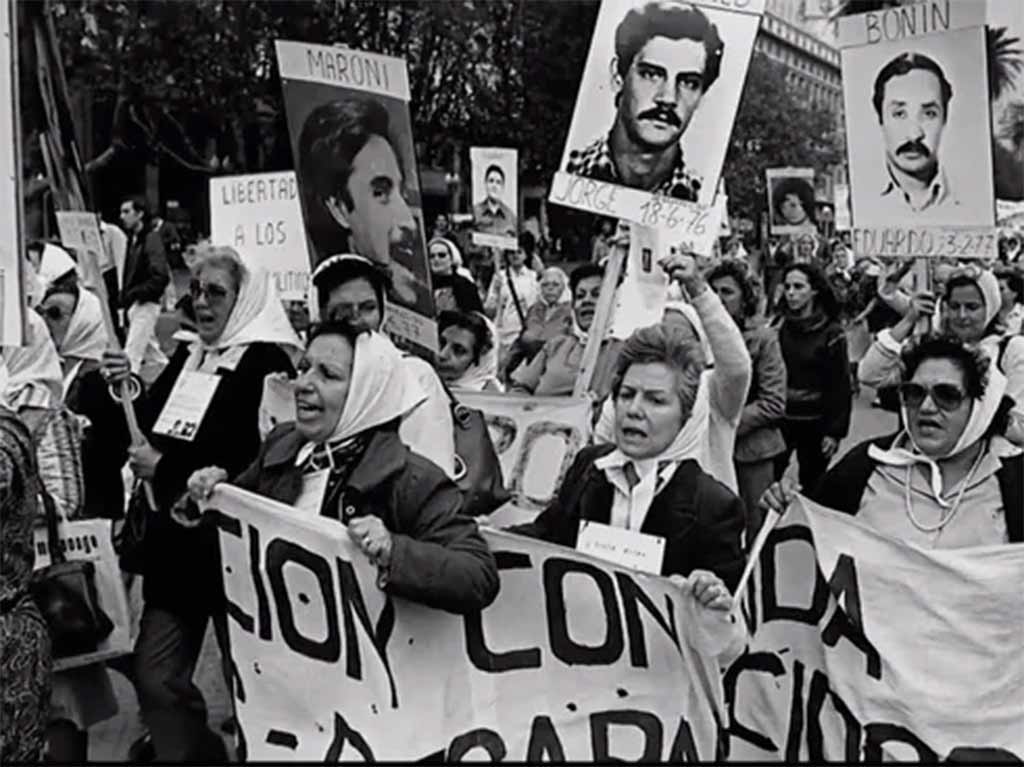 The Speaking on International Day of the Victims of Enforced Disappearances, 30 August, Ana Lorena Delgadillo Perez, a member of the United Nations Working Group on Enforced/Involuntary Disappearances spoke of “public policies and measures in which there is a dismantling of institutions, a regression of what has been achieved” in Argentina. Earlier in the month the government closed the unit created to search for people kidnapped as babies during the dictatorship.
The Speaking on International Day of the Victims of Enforced Disappearances, 30 August, Ana Lorena Delgadillo Perez, a member of the United Nations Working Group on Enforced/Involuntary Disappearances spoke of “public policies and measures in which there is a dismantling of institutions, a regression of what has been achieved” in Argentina. Earlier in the month the government closed the unit created to search for people kidnapped as babies during the dictatorship.
Human Rights groups estimate that 30,000 people disappeared under the 1976-1983 military dictatorship. Meanwhile Vice President Villarruel continues to downplay the number, claiming the true figure is closer to 9000. She said the violence meted out by the military regime was necessary to combat leftist guerrilla groups, promising to reopen criminal cases investigating the deaths of victims of left-wing guerrilla fighters.
In a separate development to the “pension moratorium” debate in recent months, Senators approved a bill to increase pensions by 8.1% to compensate for the loss of purchasing power seen in the first four months of Milei’s Presidency. It also establishes a monthly update based on the latest Consumer Price Index. Amnesty International had sent Congress a guide explaining problems with the Argentine pension system and the need for reform that guarantees retirees a dignified life. President Milei has now used his first presidential veto to overturn the pensions increase.
OUR TEAM AND YOU
Members of our team remain available to give online or face to face presentations to Local Groups on our countries. Please get in touch if you are interested!
All the best,
South America Team – Richard Crosfield (Colombia and Brazil), David Rogers (Argentina and Chile), James Baird (Venezuela) and Graham Minter (rest of South America). And please don’t forget that you can follow us on our Facebook page and Twitter.